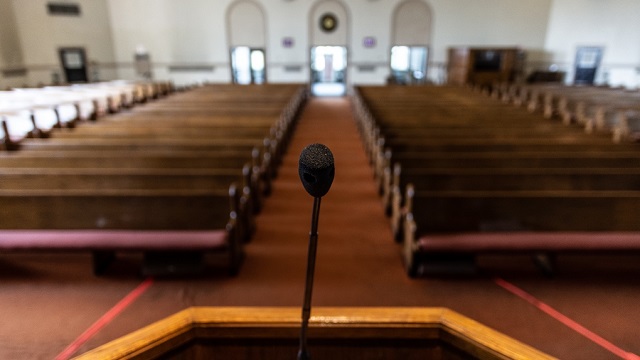Censorship Industrial Complex
“Minority Report”: The Sequel. A warning to the Canadian Church

From the Frontier Centre for Pubic Policy
In the 2002 futuristic movie, “Minority Report,” viewers are introduced to a ground-breaking technology that allows law enforcement to preview a crime before it is committed. Then this determination becomes the basis for the arrest and the sentencing of the “pre-crime” perpetrator.
In a case of life imitating art, on February 26, the Canadian government tabled legislation containing provisions that are eerily like the plot imagined in Tom Cruise’s blockbuster.
The proposed legislation should be of great concern to churches and pastors who may face unprecedented legal exposure if it is passed.
Bill C-63, the Online Harms Act, seeks to “promote online safety.” The Act endeavours, in part, to protect children from online sexual exploitation and requires the mandatory reporting of online child pornography by internet providers. So far, so good.
But the proverbial devil is lurking in the details of the provisions pertaining to online hate speech, which are simply breathtaking.
The Act represents what many consider to be the most dangerous assault on free speech this country has ever seen, prompting Canadian novelist, Margaret Atwood, to refer to the proposed legislation as “Orwellian.”
This bill would not only have a glacial effect on free speech, but it would also trigger an open season on religious organizations that do not align with mainstream dogma.
Here are some of the reasons behind this apocalyptic assessment of this piece of legislation.
The bill defines hate speech as speech that “is likely to foment detestation or vilification of an individual or group of individuals on the basis of a prohibited ground of discrimination.”
This definition is so vague, ambiguous, and far reaching that it could apply to any opinion that diverges from the government-sanctioned media narrative.
The responsibility of judging complaints would be lodged with the Human Rights Commission. This fact alone is deeply worrisome, as the threshold for deciding guilt is much lower in the Human Rights Tribunal than in a criminal court, where a person must be found guilty beyond a reasonable doubt.
Plaintiffs could file their complaints anonymously without incurring any legal costs. Defendants, on the other hand, would be bound to retain legal counsel at considerable expense to them.
Should they win their case, the plaintiffs stand to be awarded up to $20,000. The defendants could be imposed an additional fine of up to $50,000. Should a legal violation be considered to have been motivated by hate, the defendants could also face life imprisonment!
The incontrovertible proof that Bill C-63 is not about protecting children but strangling free speech resides in what is now ironically referred to as the “Minority Report” provision.
As unhinged as it sounds, the legislation states that if a member of the public has grounds to believe that someone is likely to engage in hateful speech, that person can appeal to a provincial judge who may then subject the defendant to house arrest and other restrictions.
Human nature being what it is, there is no telling the number of people who will be incentivized to file complaints knowing they have much to gain and nothing to lose.
Conservative churches would become instant targets in the tsunami of human rights violation initiatives that the proposed legislation would trigger.
In response, churches may decide to play it safe by restricting their services to in-person participation or by self-censuring.
While either choice would no doubt be welcome by a government that wants to silence those who hold “unacceptable views,” to quote Prime Minister Justin Trudeau, such restrictions would no doubt prove to be detrimental to the churches and the common good.
The proposed legislation is not about protecting children. It’s about unleashing the mob against those who would oppose an agenda that is already proving to be an existential threat to liberal society.
Bill C-63 is currently at the nexus of the fight to preserve our most fundamental freedoms, Canadian democracy, and the well-being of future generations.
Churches have a window of opportunity to voice their opposition to this appalling piece of legislation.
What can be done?
First, be informed. Videos posted by the Canadian Constitution Foundation are a great place to start.
Second, promote congregational awareness. Church leaders can no longer pretend that such issues are beyond the scope of their pulpit. To denounce injustice is indeed part and parcel of the church’s prophetic mandate.
Third, church members should contact their member of parliament to express their opposition to Bill C-63.
Canadian churches have historically chosen to remain on the far edges of the culture war currently raging in the Western world. But if Bill C-63 receives royal assent, these same churches may soon unwittingly find themselves in the middle of the very battlefield they so vigorously sought to avoid.
Pierre Gilbert is Associate Professor Emeritus at Canadian Mennonite University.
Censorship Industrial Complex
US Slams UK and EU Over Online Speech Regulation, Announces Release of Files on Past Censorship Efforts

Sarah Rogers’ comments draw a new line in the sand between America’s First Amendment and Europe’s tightening grip on online speech.
|
|
Censorship Industrial Complex
Canadian university censors free speech advocate who spoke out against Indigenous ‘mass grave’ hoax

From LifeSiteNews
Dr. Frances Widdowson was arrested and given a ticket at the University of Victoria campus after trying to engage in conversation about ‘the disputed claims of unmarked graves in Kamloops.’
A Canadian academic who spoke out against claims there are mass unmarked graves of kids on former Indigenous residential schools, and who was arrested on a university campus as a result for trespassing, is fighting back with the help of a top constitutional group.
Dr. Frances Widdowson was arrested and given a ticket on December 2, 2025, at the University of Victoria (UVic) campus after trying to engage in conversation about “the disputed claims of unmarked graves in Kamloops,” noted the Justice Centre for Constitutional Freedoms (JCCF) in a recent news release.
According to the JCCF, Widdowson was trying to initiate a “good faith” conversation with people on campus, along with the leader of OneBC provincial party, Dallas Brodi.
“My arrest at the University of Victoria is an indication of an institution that is completely unmoored from its academic purpose,” said Widdowson in a statement made available to LifeSiteNews.
She added that the “institution” has been “perpetuating the falsehood” of the remains of 215 children “being confirmed at Kamloops since 2021, and is intent on censoring any correction of this claim.”
“This should be of concern for everyone who believes that universities should be places of open inquiry and critical thinking, not propaganda and indoctrination,” she added.
UVic had the day before Widdowson’s arrest warned on its website that those in favor of free speech were “not permitted to attend UVic property for the purpose of speaking publicly.”
Despite the warning, Widdowson, when she came to campus, was met with some “100 aggressive protesters assembled where she intended to speak at Petch Fountain,” noted the JCCF.
The protesters consisted of self-identified Communists, along with Antifa-aligned people and Hamas supporters.
When Widdowson was confronted by university security, along with local police, she was served with a trespass notice.
“When she declined to leave, she was arrested, detained for about two hours, and charged under British Columbia’s Trespass Act—an offence punishable by fines up to $2,000 or up to six months’ imprisonment,” said the JCCF.
According to Constitutional lawyer Glenn Blackett, UVic actions are shameful, as it “receives hundreds of millions of taxpayer dollars annually while it facilitates the arrest of Canadians attempting to engage in free inquiry on campus.”
Widdowson’s legal team, with the help of the JCCF, will be defending her ticket to protect her “Charter-protected freedoms of expression and peaceful assembly.”
Widdowson served as a tenured professor at Mount Royal University in Calgary, Alberta, before she was fired over criticism of her views on identity politics and Indigenous policy, notes the JCCF. She was vindicated, however, as an arbitrator later found her termination was wrongful.
In 2021 and 2022, the mainstream media ran with inflammatory and dubious claims that hundreds of children were buried and disregarded by Catholic priests and nuns who ran some Canadian residential schools. The reality is, after four years, there have been no mass graves discovered at residential schools.
However, as the claims went unfounded, over 120 churches, most of them Catholic and many of them on Indigenous lands that serve the local population, have been burned to the ground, vandalized, or defiled in Canada since the spring of 2021.
Last year, retired Manitoba judge Brian Giesbrecht said Canadians are being “deliberately deceived by their own government” after blasting the former Trudeau government for “actively pursuing” a policy that blames the Catholic Church for the unfounded “deaths and secret burials” of Indigenous children.
As reported by LifeSiteNews, new private members’ Bill C-254, “An Act To Amend The Criminal Code” introduced by New Democrat MP Leah Gazan, looks to give jail time to people who engage in so-called “Denialism.” The bill would look to jail those who question the media and government narrative surrounding Canada’s “Indian Residential School system” that there are mass graves despite no evidence to support this claim.
-

 Business1 day ago
Business1 day agoICYMI: Largest fraud in US history? Independent Journalist visits numerous daycare centres with no children, revealing massive scam
-

 Alberta18 hours ago
Alberta18 hours agoAlberta project would be “the biggest carbon capture and storage project in the world”
-

 Energy15 hours ago
Energy15 hours agoCanada’s debate on energy levelled up in 2025
-

 Business16 hours ago
Business16 hours agoSocialism vs. Capitalism
-

 Energy17 hours ago
Energy17 hours agoNew Poll Shows Ontarians See Oil & Gas as Key to Jobs, Economy, and Trade
-

 Business2 days ago
Business2 days agoFeds pull the plug on small business grants to Minnesota after massive fraud reports
-

 Business2 days ago
Business2 days agoDOOR TO DOOR: Feds descend on Minneapolis day cares tied to massive fraud
-

 Business1 day ago
Business1 day agoCanada needs serious tax cuts in 2026







